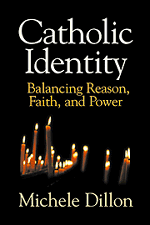Book contents
- Frontmatter
- Contents
- Acknowledgments
- 1 Pro-Change Catholics: Forging Community out of Diversity
- 2 Doctrinal Change in the Catholic Church
- 3 Official Church Teaching on Homosexuality, Women's Ordination, Abortion, and the Role of the Theologian
- 4 Pro-Change Groups in the Contemporary Church: Dignity, the Women's Ordination Conference, and Catholics for a Free Choice
- 5 Gay and Lesbian Catholics: “Owning the Identity Differently”
- 6 Using Doctrine to Critique Doctrine
- 7 Pluralism in Community
- 8 Reasoned Theology: Legitimating Emancipatory Possibilities
- 9 Catholic Options
- Appendix: Research Methodology
- References
- Index
Appendix: Research Methodology
Published online by Cambridge University Press: 04 August 2010
- Frontmatter
- Contents
- Acknowledgments
- 1 Pro-Change Catholics: Forging Community out of Diversity
- 2 Doctrinal Change in the Catholic Church
- 3 Official Church Teaching on Homosexuality, Women's Ordination, Abortion, and the Role of the Theologian
- 4 Pro-Change Groups in the Contemporary Church: Dignity, the Women's Ordination Conference, and Catholics for a Free Choice
- 5 Gay and Lesbian Catholics: “Owning the Identity Differently”
- 6 Using Doctrine to Critique Doctrine
- 7 Pluralism in Community
- 8 Reasoned Theology: Legitimating Emancipatory Possibilities
- 9 Catholic Options
- Appendix: Research Methodology
- References
- Index
Summary
This methodological appendix explains the study's research design, including how the sample was chosen, the data gathering methods used, and the kinds of questions asked of each group. It also provides a sketch of respondents' sociodemographic characteristics. As documented by the Encycbpedia of Associations (Gale Research Company 1995: 2259–2282), there are many Catholic organizations whose purpose is to lobby for changes in official church teachings and institutional practices. Since the theoretical interest of this study lay in investigating why institutionally marginalized Catholics stay Catholic, I selected single-issue groups whose pro-change activities aim to make the church more inclusive, participatory, and pluralistic. I chose organizations identified with the culturally and institutionally salient issues of homosexuality, women's ordination, and abortion, respectively, rather than with narrower intrachurch issues such as celibacy, or multi-issue Catholic organizations whose purposes are more diffuse. Dignity, WOC, and CFFC are the sole organizations representing the respective interests of gay and lesbian Catholics, advocates of women's ordination, and pro-choice Catholics. I also included professional Catholic theologians because their subordinate relation to the church hierarchy gives them a relatively marginalized position from which, as doctrinal experts, they interpret Catholicism.
In order to explore why marginalized Catholics stay Catholic, I used a combination of research methods including content analysis of organizational documents, ethnographic observation, self-administered mail questionnaire surveys, and in-depth personal interviews.
- Type
- Chapter
- Information
- Catholic IdentityBalancing Reason, Faith, and Power, pp. 257 - 268Publisher: Cambridge University PressPrint publication year: 1999



